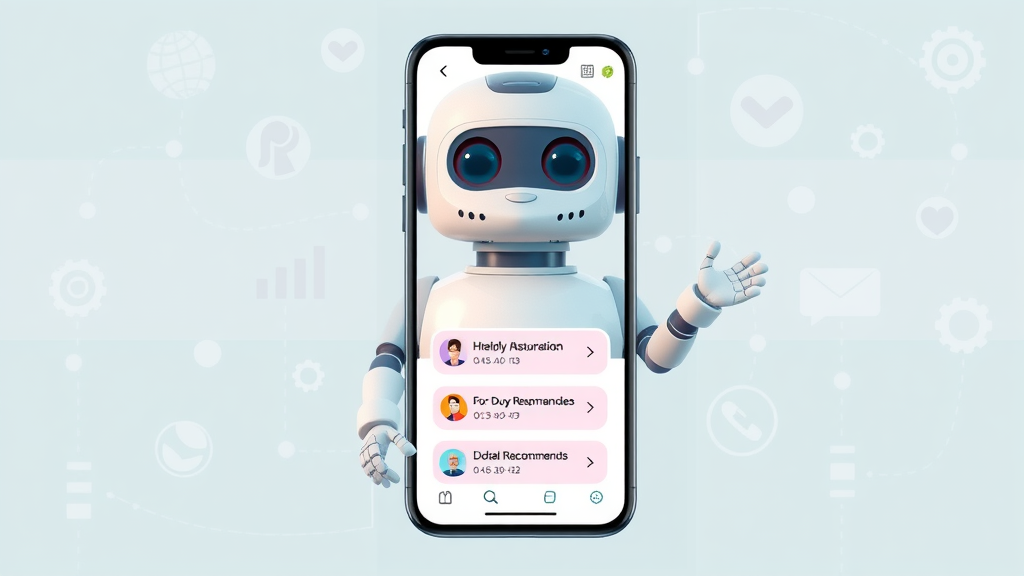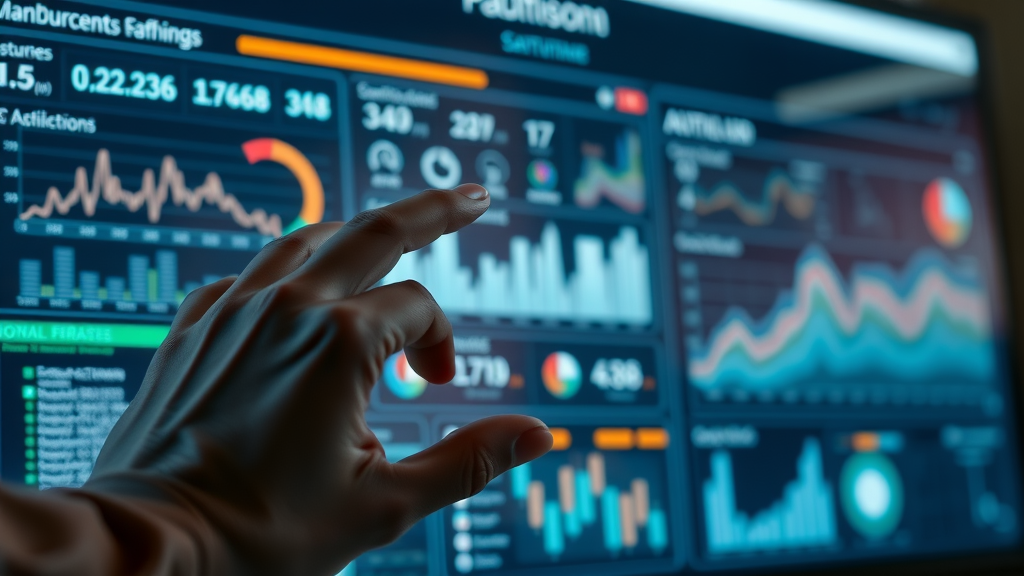Did you know that by 2025, over 80% of marketing leaders expect to rely on artificial intelligence in their digital marketing efforts? This astonishing figure reveals an industry on the brink of a technological revolution. In today's digital-first landscape, artificial intelligence marketing isn’t just a buzzword—it's driving smarter campaigns, deeper customer understanding, and record-breaking results. If you’re looking to future-proof your marketing strategy or gain a decisive edge in the competitive AI market , understanding the true power of artificial intelligence in marketing is a game-changer. Read on to discover how AI is reshaping digital marketing as we know it.
Revealing the Impact: How Artificial Intelligence Marketing Is Transforming the Digital Marketing Landscape
Artificial intelligence marketing is radically transforming the digital marketing landscape. With AI-powered tools and analytics, brands can now process vast amounts of customer data in real time, uncovering trends and patterns never before possible. This data-driven approach empowers marketing teams to develop hyper-personalized strategies, target customers with pinpoint accuracy, and connect more authentically at every touchpoint. Through AI marketing, professionals can automate routine tasks, optimize digital campaigns, and produce highly relevant content faster than ever.
One of the most profound impacts of artificial intelligence marketing is its ability to deliver predictive analytics. Marketers can now forecast outcomes, recommend next steps, and react swiftly to market changes. AI tools—using advanced machine learning and natural language processing—deliver actionable insights for improved customer engagement and experiences. Practical examples include dynamic ad targeting, automatic social media scheduling, and AI-powered content generation for media posts and email marketing. As marketers adopt AI across their strategies, they uncover previously hidden opportunities and unlock new levels of performance.

A Surprising Statistic: The Rapid Growth of Artificial Intelligence in Digital Marketing
The growth of artificial intelligence in digital marketing is nothing short of staggering. Industry analysts report that investments in AI marketing technology are doubling year-over-year, with the AI market for digital marketing expected to surpass $50 billion by 2025. What drives this explosive growth? The ability of AI to automate complex processes, extract meaning from unstructured data, and offer real-time responses has made it indispensable to ambitious marketing teams. These trends underline why brands that adopt artificial intelligence early enjoy a strong competitive advantage and accelerated ROI compared to those that lag behind.
Why Artificial Intelligence Marketing Is the Future of Effective Marketing Strategy
As customer expectations continue to rise, traditional marketing strategies often fall short in delivering personalized, timely, and relevant experiences. Artificial intelligence marketing bridges this gap by enabling brands to analyze vast amounts of customer data and adapt their approach instantly. Whether it's segmenting audiences, predicting purchase behaviors, or crafting individualized content, AI allows for a level of precision and agility that manual methods simply can't match. The future of effective marketing strategy lies in blending human creativity with the speed and scalability of AI-powered insights, fostering relationships that build loyalty and drive lifetime value.
"By 2025, 80% of marketing leaders expect to rely on artificial intelligence in their digital marketing efforts."
Unlocking Artificial Intelligence Marketing: Core Concepts and Fundamentals
Defining Artificial Intelligence Marketing and Its Role in Digital Marketing
Artificial intelligence marketing refers to the use of AI-powered technologies—such as machine learning , natural language processing, and predictive analytics—to make data-driven marketing decisions and automate key processes. In the digital marketing world, AI acts as a catalyst for more efficient content creation, smarter ad targeting, and real-time customer engagement. Its role goes beyond automation: AI can generate insights from historical data , optimize digital campaigns, and even interact directly with consumers through chatbots and AI-driven assistants.
For modern marketing teams, the integration of AI has become foundational. From customizing social media posts to tailoring product recommendations, artificial intelligence in marketing ensures that every message resonates with the right audience at the right moment. This shift is helping brands improve operational efficiency, maximize ROI, and innovate customer experiences at scale.

The AI Market: Key Trends and Figures in Artificial Intelligence for Marketing
The AI market for digital marketing is on an upward trajectory. Key trends include the rise of AI chatbot assistants, voice search optimization powered by natural language processing, and the growing popularity of generative AI tools for content creation. Surveys indicate that over a third of all marketing teams regularly use at least one AI tool to inform their daily work, while leading organizations are integrating AI across various stages of the customer journey.
Adoption is especially pronounced in industries like ecommerce, where AI helps automate pricing, analyze market demand, and generate real-time product recommendations. The ability to quickly adapt strategies based on customer data analytics and shifting market conditions puts AI-powered businesses at the forefront of the digital marketing revolution.
Main Pillars: How AI in Marketing Supports Modern Marketing Strategies
There are three main pillars of artificial intelligence marketing that support modern strategies: data-driven decision making, automated content generation, and predictive analytics. First, AI unlocks deep customer insights by structuring and analyzing massive amounts of data from multiple sources. Second, it streamlines the creation of email campaigns, social media posts, and media assets—empowering teams to scale content marketing while ensuring relevance and personalization at every stage.
Lastly, predictive analytics gives marketers the tools to anticipate customer behavior and create truly dynamic experiences. AI models adjust messaging, offers, and delivery channels based on how users interact in real time, closing the loop between marketing intent and customer need. The result: higher engagement, better conversion rates, and a clear edge in the AI market .
| Aspect | Traditional Marketing | Artificial Intelligence Marketing |
|---|---|---|
| Data Analysis | Manual, slow, limited to small data sets | Automated, real-time, vast amounts of customer data |
| Personalization | Generalized, one-size-fits-all approach | Hyper-personalized, predictive, tailored to customer behavior |
| Content Creation | Human-driven, slow, resource-intensive | AI-generated, scalable, fast and data-driven |
| Customer Engagement | Sporadic, less interactive | 24/7, interactive, dynamic via AI-powered chatbots and assistants |
| Campaign Optimization | Manual testing, slower feedback loops | AI-driven, continuous, real-time optimization |
What You'll Gain: Mastering Artificial Intelligence Marketing for Strategic Advantage
- Understand the key components of artificial intelligence marketing
- Discover how AI tools shape digital marketing campaigns
- Learn to integrate AI into your content marketing and email marketing
- Unlock predictive analytics, generative AI, and customer data utilization
- Explore actionable steps for your marketing team or agency

People Also Ask: What Is Artificial Intelligence in Marketing?
Artificial Intelligence Marketing Explained
Artificial intelligence marketing is the use of advanced AI tools, models, and algorithms to assist marketers in making smart, data-informed decisions and automating campaign operations. Using AI in marketing involves applying machine learning and natural language processing to analyze customer data , predict outcomes, and personalize messaging across platforms like email marketing, social media, and content marketing. In essence, AI marketing transforms how businesses approach customers—evolving from intuition-based strategies to highly measurable, adaptable marketing efforts powered by data and technology.
People Also Ask: What Is the Best Example of AI in Marketing?
Unveiling Top Artificial Intelligence Marketing Case Studies
Some of the most compelling examples of artificial intelligence marketing are found in household brands. Amazon, for instance, leverages AI-powered recommendation engines that analyze customer behavior and purchase history to suggest highly relevant products. Netflix applies similar principles, using AI to deliver content recommendations and optimize viewer retention. In the realm of social media , Facebook and Instagram harness AI tools to auto-generate personalized ads and curate media posts, dramatically increasing ad performance and user engagement.
Beyond these giants, smaller businesses use AI-powered chatbots to answer customer queries instantly, score leads, and automate responses based on natural language processing . These examples demonstrate that AI marketing isn’t just for massive enterprises—its flexibility and scalability make it a practical solution for companies of all sizes looking to stand out in the crowded AI market .

People Also Ask: Does AI Marketing Actually Work?
Evaluating the Real-World Impact of Artificial Intelligence Marketing
The evidence is clear— artificial intelligence marketing delivers real, measurable results. Case studies reveal that brands deploying AI tools in their campaigns experience higher conversion rates, improved customer engagement, and stronger ROI. For example, a retailer using predictive analytics might reduce abandoned carts by automatically re-engaging shoppers with personalized offers delivered via email or social media posts. A travel company might use AI models to dynamically adjust pricing and messaging, influencing customer decisions in real time based on browsing patterns and historical data.
These tangible benefits are driving more marketing teams to adopt AI-driven approaches. Not only does AI marketing streamline campaign management and reduce manual work, but it also enables a deeper connection between brands and their audiences by leveraging dynamic, data-based personalization.
People Also Ask: How to Effectively Use AI for Marketing?
Step-By-Step Approach to Adopting Artificial Intelligence Marketing
Successfully integrating artificial intelligence marketing into your digital strategy requires a thoughtful, incremental approach:
- Assess Your Current Marketing Tools and Data: Identify where AI can complement or replace manual tasks within your existing digital marketing setup.
- Select the Right AI Tools: Research platforms that offer features relevant to your needs, such as content marketing automation, predictive analytics, and customer data enrichment.
- Start Small, Scale Fast: Begin with a pilot project—such as AI-driven email marketing or automated social media posting—to test effectiveness and refine your process.
- Train Your Team: Continuous education ensures your marketing team stays adept with the latest AI-powered platforms and strategy updates.
- Analyze, Optimize, Repeat: Use real-time insights from your AI tools to continually optimize campaigns, measure performance, and adapt your approach for greater impact.

The Evolution of Artificial Intelligence in the AI Market and Its Role in Digital Marketing
From Rules-Based Automation to Generative AI: A Timeline
The history of artificial intelligence marketing stretches back to rule-based automation and simple algorithms. Early email automation tools triggered messages based on fixed actions like downloads or site visits. Soon, machine learning enabled more sophisticated personalization, learning from vast amounts of customer data to refine messaging and target user segments. Fast-forward to today, and generative AI models—powered by deep learning—create original content, generate and optimize marketing campaigns, and personalize experiences at scale.
This evolution marks a transition from reactive to proactive marketing. AI in marketing is now characterized by predictive outcomes, dynamic engagement, and an ongoing feedback loop that continually refines strategies for the changing digital landscape.
Current Trends in AI Marketing Shaping Modern Digital Ecosystems
Modern digital marketing ecosystems are shaped by the growing adoption of generative AI, voice assistants, and AI-driven analytics dashboards. Marketing teams use these technologies for sentiment analysis, customer journey mapping, and multichannel campaign optimization. Social media platforms now employ AI to combat misinformation, target media posts, and amplify brand reach. Crucially, the convergence of AI and the Internet of Things (IoT) is unlocking new touchpoints for customer engagement, paving the way for innovative marketing strategies that blend automation with real-world experiences.

| Year | Milestone | AI Marketing Impact |
|---|---|---|
| 2000s | Email Automation | Trigger-based email campaigns begin, allowing basic personalization. |
| 2010s | Machine Learning in Ad Targeting | Real-time bidding and personalized digital ads improve campaign ROI. |
| 2015-2019 | AI Chatbots & Content Recommendation | Improved customer engagement and conversion rates through conversational AI and dynamic content curation. |
| 2020-Present | Generative AI & Predictive Analytics | Automated content creation, predictive customer journey mapping, and adaptive marketing strategies. |
Key Artificial Intelligence Marketing Tools: Enhancing Every Marketing Strategy
Top AI Tools for Marketing Teams in 2024
As the AI market evolves, a variety of AI tools have become indispensable for modern marketing teams. Popular platforms like Jasper, ChatGPT, HubSpot, Salesforce Einstein, and Adobe Sensei offer unique features for content creation, predictive analytics, and customer data analysis. These tools integrate seamlessly with existing digital marketing systems, automating workflows and providing actionable insights to maximize campaign performance.
Adopting the right AI marketing platforms depends on your organization’s strategic goals. For example, Jasper and ChatGPT excel in generating personalized content at scale for websites, email marketing, and social media posts. HubSpot and Salesforce Einstein help unify customer data and manage journey automation, while Adobe Sensei powers visual asset generation and performance analytics. The right mix of AI tools empowers marketing teams to work smarter, not harder, in a highly competitive market.

Harnessing AI Tools for Content Marketing and Campaign Optimization
AI tools are revolutionizing content marketing by enabling automated content creation, smart scheduling, and campaign optimization. With platforms like Jasper and ChatGPT, marketers can instantly generate engaging blog posts, product descriptions, and even social media content tailored for specific audiences. Combined with HubSpot or Salesforce Einstein, these tools help identify high-performing content topics based on search data, competitor analysis, and customer engagement metrics.
This integrated approach ensures that every marketing effort is optimized in real time, from email marketing workflows to digital and media campaigns. Ultimately, AI tools unlock new possibilities in content marketing, making it easier for teams to connect with customers and outperform competition across all channels.
- Popular artificial intelligence marketing platforms: Jasper, ChatGPT, HubSpot, Salesforce Einstein, Adobe Sensei
The Power of Predictive Analytics in Artificial Intelligence Marketing
How Predictive Analytics Revolutionizes Digital Marketing Initiatives
Predictive analytics—one of the cornerstones of artificial intelligence marketing —enables brands to forecast customer needs, predict campaign outcomes, and allocate budgets more effectively. By analyzing historical data as well as real-time interactions, AI models detect trends and signal upcoming opportunities or threats. This empowers marketing teams to focus resources where they matter most and intervene before issues escalate.
The power of predictive analytics lies in its ability to drive results at every stage of the customer journey. For instance, it can anticipate which leads are most likely to convert, what type of content will boost engagement, and when to deliver offers for maximum impact. The use of predictive models transforms digital marketing from a reactive practice to a proactive, continuously improving strategy.
Using Predictive Models to Optimize AI Marketing Campaigns
AI marketing leverages predictive models to continuously optimize campaigns. These models incorporate live customer data, social media signals, and engagement patterns to adjust messaging, timing, and channel mix on the fly. As a result, brands can increase response rates, reduce budget waste, and discover new segments or message variations for even greater impact.
In practice, predictive analytics tools like Salesforce Einstein and Adobe Sensei offer visual dashboards that make it easy for marketing teams to see what's working and pivot quickly. This data-driven agility is crucial in today’s fast-paced market, setting top performers apart from the competition.
Generative AI and Its Application in Artificial Intelligence Marketing
Generative AI in Content Creation and Personalization
Generative AI is revolutionizing the way marketers approach content creation and personalization. Using advanced machine learning, generative AI models can write compelling email copy, craft unique blog posts, and even design visual creatives based on audience preferences and campaign goals. This technology not only accelerates content production but ensures each piece is optimized for specific customers, reacting to their behaviors in real time.
Leading platforms like Jasper and ChatGPT are enabling brands to maintain a consistent voice across channels while refreshing content at scale. AI-powered content personalization is no longer a luxury for large enterprises—it's accessible to businesses of all sizes, providing competitive advantage in the crowded digital marketing arena.

Leveraging AI for Dynamic Digital Marketing Strategy Development
Dynamic digital marketing strategies rely on generative AI to test creative ideas, automate A/B testing, and tailor messaging to evolving customer interests. AI tools generate real-time data on the performance of various media posts, channels, and content types, helping marketers quickly identify and amplify winning strategies.
This iterative approach means marketers are not just reacting to historical data, but actively innovating and improving based on live feedback. By leveraging AI for dynamic strategy development, brands can stay ahead of market trends, maximize campaign effectiveness, and deliver breakthrough marketing results.
Harnessing Customer Data in Artificial Intelligence Marketing for Superior Results
Collecting and Analyzing Customer Data with AI Marketing Tools
AI marketing tools are designed to collect, structure, and analyze customer data from multiple sources—social media, web analytics, CRM systems, surveys, and more. Machine learning algorithms then uncover patterns, preferences, and behaviors that would otherwise remain hidden. This analysis is essential for creating targeted campaigns, identifying opportunities for upsell or cross-sell, and personalizing every point of contact.
With the ability to process vast amounts of information in real time, AI marketing tools empower teams to gain a 360-degree view of their audience. By harnessing this data, marketers can deliver consistent, relevant, and highly engaging experiences throughout the customer lifecycle.
Personalized Digital Marketing through Artificial Intelligence
Personalization is where artificial intelligence marketing shines brightest. Using AI, brands can customize everything—from web experiences to email marketing campaigns and social media posts—based on user preferences, behaviors, and historical engagement. Natural language processing enables chatbots and virtual assistants to deliver conversational, human-like interactions at any scale.
This personalized approach improves customer engagement, increases conversion rates, and builds brand loyalty. The more intelligently a business can use customer data, the more effectively it can meet expectations and drive sales.
Email Marketing and Content Marketing: Integrating AI Into Daily Workflows
AI-Powered Email Marketing Tools for Enhanced Engagement
Today’s best email marketing solutions incorporate artificial intelligence to optimize subject lines, personalize content, and test layouts for each subscriber. AI-driven platforms analyze open and click data in real time, recommending or auto-selecting the most compelling content for each segment. For example, tools like HubSpot and Salesforce Einstein use predictive analytics to determine the ideal send time and frequency, significantly boosting engagement rates.
Integrating AI into email marketing workflows not only streamlines campaign creation but makes every message more relevant and engaging. As a result, brands see higher conversions, better retention, and improved overall marketing ROI.
AI-Driven Content Creation for Multichannel Campaigns
AI content generators and scheduling tools help marketers efficiently produce, distribute, and monitor campaigns across websites, blogs, social platforms, and email. Generative AI ensures message consistency while adapting tone and format for each unique channel. With constant monitoring and real-time optimization, AI-driven content marketing delivers more engaging experiences, greater reach, and stronger customer relationships.

Best Practices: How Marketing Teams Can Succeed with Artificial Intelligence Marketing
Training Your Marketing Team in Artificial Intelligence and AI Tools
The first step to successful AI integration is comprehensive training. Marketing teams need to understand the underlying AI technologies and how to use new AI tools effectively. Ongoing workshops, certifications, and exposure to evolving platforms like generative AI are critical. Encouraging experimentation and knowledge sharing builds confidence and helps teams unlock the full value of AI in their daily marketing efforts.

Practical Tips for Scaling Artificial Intelligence Marketing Efforts
When scaling AI-powered marketing strategies, start with small wins and use them to build momentum. Track the use and effectiveness of each AI tool, refine your approach based on analytics, and always prioritize data privacy. Foster a collaborative culture where marketers and technologists work hand-in-hand. Success relies on balancing automation with ongoing creative input—don’t simply rely on technology alone.
- Do: Invest in AI upskilling for your team, embrace a data-driven approach, continuously review analytics.
- Don’t: Ignore data privacy, rely solely on automation, overlook creative strategy.
Innovative Marketing Strategies: Blending Artificial Intelligence with Traditional Campaigns
Leveraging AI Market Insights for Next-Gen Digital Marketing
Blending AI with traditional marketing campaigns allows for smarter budgeting, superior targeting, and more meaningful content. The best AI market insights fuel innovative strategies, enabling teams to test new channels, split test offers, and rapidly respond to shifting trends. Insight-driven decisions help maximize return on marketing spend and deliver measurable improvements across all campaign types.
Balancing Automation with Human Creativity in Marketing Strategy
While automation unlocks new efficiencies, human creativity remains crucial for standout marketing campaigns. The most effective marketing teams use artificial intelligence to remove repetitive tasks and surface deeper insights, while reserving strategic direction and creative ideation for humans. This hybrid approach yields marketing strategies that are both innovative and highly executional—accelerating business growth, brand loyalty, and differentiation in an AI-saturated marketplace.
Future Outlook: Where Artificial Intelligence Marketing Is Headed
Emerging Trends in AI in Marketing and the AI Market
The future of artificial intelligence marketing is bright, with ongoing advances in natural language processing, autonomous media buying, and AI-powered visual content creation. Platforms will become increasingly self-optimizing, reducing manual input while expanding personalization and customer engagement opportunities. As AI tools become more accessible, even small firms will compete with enterprise-level marketing firepower.
How Generative AI Will Shape the Future of Digital Marketing
Generative AI is set to dominate the next chapter in digital marketing. From real-time, multi-format content to personalized virtual agents, tomorrow’s marketing strategies will be built on instantly adaptive, creative technology. This will help brands break through the noise, build deeper connections with audiences, and run campaigns that are more measurable and effective than ever before.
Key Takeaways on Artificial Intelligence Marketing for Ambitious Marketers
- Artificial intelligence marketing transforms strategies, content, and customer engagement
- Leading brands leverage AI tools, predictive analytics, and generative AI
- Success comes from blending technology, data, and creativity in marketing teams
Frequently Asked Questions About Artificial Intelligence Marketing
How does artificial intelligence marketing differ from traditional digital marketing?
Artificial intelligence marketing uses advanced algorithms and data analytics to deliver highly personalized, real-time experiences, in contrast to traditional digital marketing, which often relies on manual segmentation and broad messaging. AI marketing also automates repetitive tasks, enables predictive analytics, and adapts campaigns on the fly for optimal engagement and results.
What types of AI tools are best for content marketing and email marketing?
The best AI tools for content marketing include Jasper and ChatGPT for copywriting, while HubSpot, Salesforce Einstein, and Adobe Sensei offer robust features for both content scheduling and email optimization. These platforms use machine learning to automate content creation, timing, and personalization, boosting campaign performance and efficiency.
Is artificial intelligence marketing suitable for small businesses?
Yes, artificial intelligence marketing is accessible and effective for businesses of all sizes. Affordable AI tools can automate email marketing, personalize social media posts, and enhance customer engagement, helping small businesses compete with larger brands on a more level playing field.
How can marketing teams stay up-to-date with the latest artificial intelligence trends?
Marketing teams can stay current by following thought leaders, subscribing to industry newsletters, participating in webinars or workshops, and testing new AI marketing tools as they emerge. Continuous learning and experimentation are key to leveraging the full potential of AI-driven digital marketing.
Accelerate Your Success: Start Integrating Artificial Intelligence Marketing Today
Ready to transform your marketing results? Start by choosing one AI marketing tool, training your team, and measuring impact. Embrace change—because the future belongs to marketers who harness the true power of artificial intelligence.
Artificial intelligence (AI) is revolutionizing marketing by enabling brands to process vast amounts of customer data in real time, leading to hyper-personalized strategies and more authentic customer connections. AI-powered tools facilitate automation of routine tasks, optimization of digital campaigns, and rapid content production. For instance, European fashion retailer Zalando has integrated generative AI to accelerate content creation for marketing campaigns, reducing image production times from six to eight weeks down to three to four days, and cutting associated costs by 90%. ( reuters.com ) Similarly, WPP, a leading advertising agency, is aggressively embracing AI to stay relevant amidst industry changes, demonstrating AI’s capabilities by recreating a Super Bowl ad at a fraction of the original cost and time, achieving comparable quality. ( ft.com ) These examples underscore AI’s transformative impact on marketing efficiency and effectiveness.
 Add Row
Add Row  Add
Add 






Write A Comment